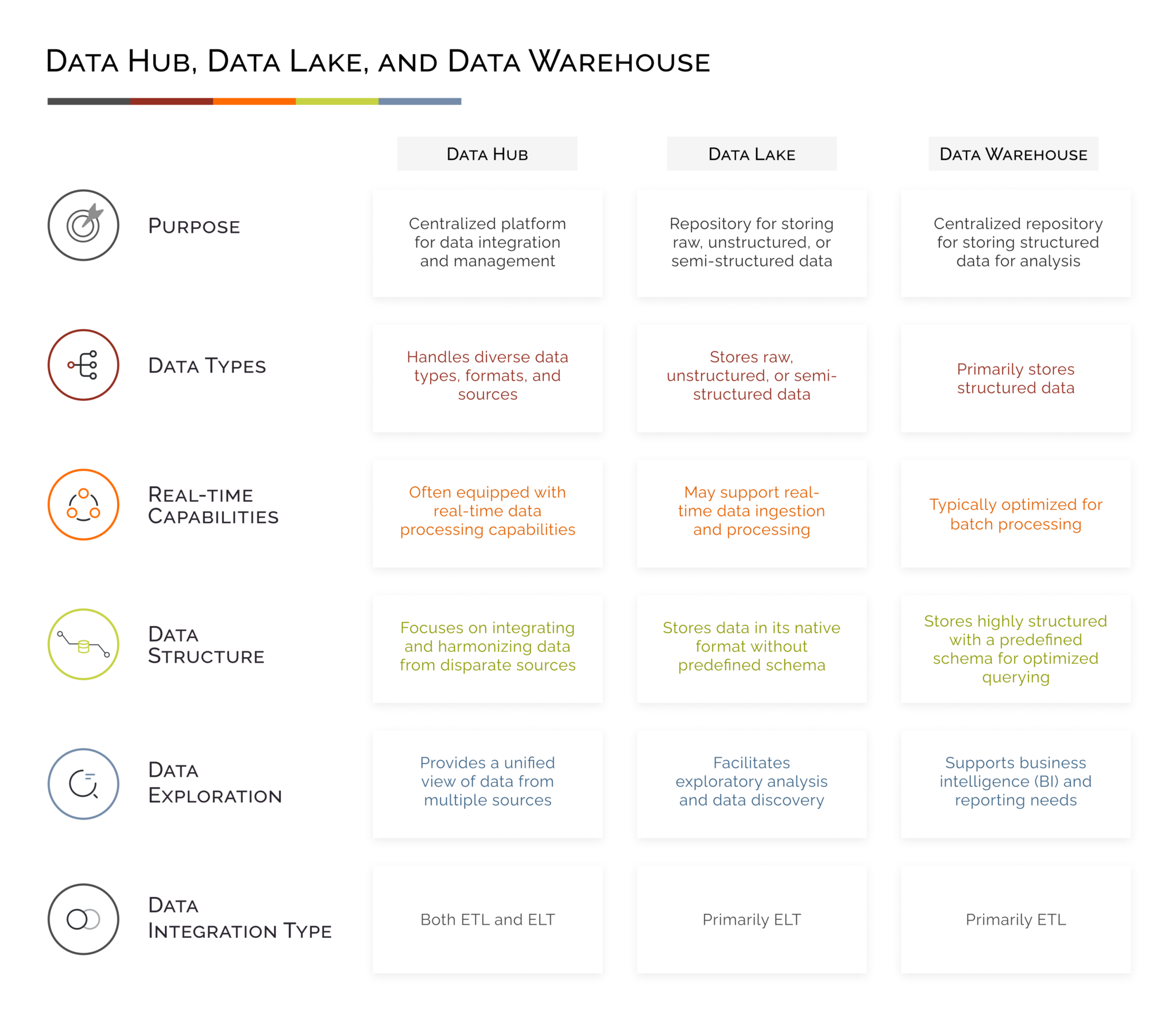Did you know that by 2025, the world is expected to generate over 180 zettabytes of data?
With such an exponential growth in data production, businesses are facing a critical imperative to become data literate. Data literacy is not just about understanding numbers; it’s about extracting meaningful insights from the datasets to drive informed decision-making.
Enter data hub—a centralized platform designed to streamline data management, integration, and analysis.
Here’s what you can expect to learn from the blog piece:
- The definition of data hub
- How it differs from other data management solutions
- Core components and architecture
- Key benefits
What is a Data Hub?
A data hub is a centralized platform or repository designed to facilitate the management, integration, and analysis of large data volumes that are scattered across disparate sources within an organization. It serves as a foundational infrastructure that enables businesses to consolidate diverse data sets, including structured, semi-structured, and unstructured data, into a unified format.
Data Hub vs Data Lake vs Data Warehouse
When discussing modern data platform architecture, three concepts often emerge: data hubs, data warehouses, and data lakes. While they may seem interchangeable, each serves distinct purposes and are often utilized together for comprehensive data management.
Here’s a comparative overview to distinguish between them:

An overview of the Data Hub Architecture
The data hub architecture is a comprehensive framework designed to streamline data management, integration, governance, and analytics within an organization. It serves as a centralized platform for ingesting, storing, processing, and distributing data from disparate sources. Here’s a detailed explanation of the key components and principles of a data hub architecture:
Data Ingestion
- Data hubs begin by ingesting data from various sources, including databases, applications, IoT devices, social media feeds, and more.
- Ingestion methods may include batch processing, streaming, change data capture, and API integrations to accommodate different data ingestion requirements. Data is collected and staged for further processing and analysis.
Data Storage
- Once ingested, data is stored in a centralized repository, which could be a traditional database, data lake, or cloud-based storage solution.
- Storage solutions are chosen based on factors such as scalability, performance, cost, and compliance requirements.
- The storage layer ensures data durability, availability, and accessibility for downstream processing and analysis.
Data Integration
- Data integration is a critical component of the data hub architecture. It involves the harmonization of diverse data sets to ensure consistency and accuracy.
- Modern integration tools and frameworks facilitate the transformation, cleansing, and enrichment of data to prepare it for analysis.
- Data pipelines and workflows orchestrate the movement of data across systems and enable seamless integration with downstream applications and analytics tools.
Data Governance
- Robust mechanisms are implemented to ensure data quality, security, and compliance with regulatory requirements.
- Policies, standards, and controls are defined to govern data access, usage, privacy, and retention.
- Metadata management, data lineage, and auditing capabilities provide transparency and accountability in data management practices.
Scalability and Flexibility
- The architecture of a data hub is designed to scale horizontally and vertically to accommodate growing volumes of data and evolving business requirements.
- Flexible deployment options, including on-premises, cloud, and hybrid architectures, enable organizations to adapt to changing needs and infrastructure preferences.
Benefits of a Data Hub
According to Gartner research, 46% of data and analytics leaders are leveraging data hubs as part of their data management strategies. Wondering what’s driving the adoption? Let’s look at a few benefits of incorporating data hubs into an organization’s data architecture.
Enable unified data integration and management
- A modern data hub enables enterprises to integrate and manage diverse data sources, formats, and types in a unified manner. This centralized approach provides a single source of truth for data, ensuring consistency, reliability, and accessibility across the organization.
- Let’s say there’s a retail chain that operates both brick-and-mortar stores and an online e-commerce platform. By implementing a data hub, the company can integrate data from various sources, including point-of-sale systems, customer databases, website analytics, and supply chain management systems.
- This unified data view will allow the company to analyze customer behavior, optimize inventory levels, personalize marketing campaigns, and improve overall operational efficiency.
Facilitate real-time data processing and analytics
- According to McKinsey Research, companies that use customer behavior insights achieve 85% higher sales growth and over 25% higher gross margins compared to their counterparts.
- A modern data hub offers real-time data processing and analytics capabilities and enables enterprises to analyze and act on data in near real-time. This capability empowers organizations to make timely decisions, respond quickly to market changes, and capitalize on emerging opportunities.
- Imagine a scenario where a financial services firm wants to detect and prevent fraudulent transactions in real-time.
- By leveraging a data hub with stream processing capabilities, the company can ingest transaction data from multiple channels, apply advanced analytics and machine learning algorithms to identify suspicious patterns, and trigger immediate alerts or interventions to mitigate fraud risks.
Enhance Scalability
- As discussed earlier as well, a modern data hub is designed to scale seamlessly to accommodate growing data volumes and evolving business requirements.
- Whether it's adding new data sources, supporting increased user access, or expanding analytical capabilities, the data hub provides the flexibility to adapt to changing needs without compromising performance or reliability.
- Let’s say there’s a healthcare organization that needs to manage and analyze large volumes of patient data from electronic health records, medical devices, and clinical trials. As the organization grows and accumulates more data, it requires a scalable data management solution.
- By deploying a data hub, the healthcare organization can efficiently scale its infrastructure, handle increasing data volumes, and support advanced analytics for medical research, personalized patient care, and operational efficiency improvements.
Wrapping up
Informatica Data Integration Hub is a prime example of a modern data hub that offers many benefits. It orchestrates various data management functions, such as integration, quality, and master data management, within single or multiple workflows. It leverages both on-premises and cloud data lakes and enables processing at Hadoop-scale through Informatica Big Data Management. The hub replaces data silos, unifying integration across multiple clouds, on-premises systems, and big data environments.
Additionally, it facilitates data sharing by accelerating access through self-service and reduces wait times for custom integrations. As a Platinum Partner with Informatica, we leverage Informatica’s comprehensive suite of data management products to create customized MDM strategies that address our clients’ unique requirements.
Our team has a wealth of experience in designing, implementing, and optimizing MDM solutions, and we have collaborated on the development of numerous cloud products. Additionally, we have developed accelerators and quickstart programs specifically designed for Informatica environments.
Get in touch to discuss data transformation for your business.
Authors

Shalu Santvana
Content Crafter

Mohd Imran
Senior Consultant



